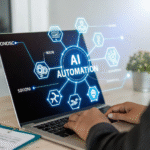Key Takeaways
- AI automation agents are revolutionizing industries, driving innovation and operational efficiency: These intelligent systems integrate seamlessly into diverse business workflows, optimizing processes and enabling transformative growth.
- Adaptive workflow optimization ensures flexibility and precision: Unlike traditional rigid systems, AI agents modify and learn dynamically, making them highly effective in improving efficiency and productivity.
- Top AI platforms provide scalable, cost-effective solutions: By utilizing advanced AI platforms, organizations can innovate and grow without requiring extensive infrastructure overhauls, ensuring seamless adoption.
- Versatility across industries demonstrates AI’s transformational potential: From enhancing patient care in healthcare to boosting fraud detection in finance and improving personalized education, AI agents deliver unparalleled value in multiple sectors.
- Simplifying intricate workflows enables innovation: By managing complex, large-scale operations with greater accuracy and speed, AI agents free businesses to focus on strategic growth.
- AI’s adaptability extends to unconventional fields: Beyond tech-heavy domains, AI agents are unlocking new value in agriculture, education, and environmental sciences, showcasing their flexibility across untapped areas.
- Long-term adaptability solidifies AI’s role as a game-changer: Advanced AI automation thrives in dynamic environments by continuously learning and improving, ensuring sustained performance gains over time.
As businesses increasingly adopt AI automation agents, it becomes essential to understand their unparalleled potential to revolutionize workflows, optimize operations, and create industry-wide impact. The sections below will explore the tools, platforms, and strategies needed to leverage these intelligent technologies effectively.
Introduction
In today’s fast-paced world, where operational excellence often defines competitive advantage, businesses are turning to innovative technologies to streamline their processes and future-proof their operations. Emerging as a frontrunner in this technological revolution are AI automation agents—intelligent systems poised to redefine how industries operate. These agents are not just tools for convenience; they represent a paradigm shift, transforming intricate workflows into smooth, efficient processes and enabling businesses to meet evolving demands with precision and agility.
By leveraging their adaptive and scalable nature, AI automation agents empower organizations to tackle challenges across a multitude of sectors, including healthcare, education, finance, and agriculture. Their ability to enhance productivity, drive innovation, and reduce complexity delivers measurable benefits, from cost savings to improved decision-making. This article explores how these groundbreaking systems are reshaping industries, offering insights into how businesses can embrace AI to stay ahead in a competitive landscape.
How AI Automation Agents Transform Industries
Enhancing Workflow Optimization
One of the most profound contributions of AI automation agents lies in their ability to optimize workflows. Unlike traditional automation systems that follow predetermined rules, AI agents use machine learning and advanced analytics to adapt to the unique requirements of different tasks. This dynamic approach enables them to streamline repetitive, time-consuming processes while tackling more complex operations with precision. For instance, in marketing, AI agents help design targeted campaigns by analyzing customer behavior in real time, while in legal services, they automate document review and compliance tracking, drastically reducing workload.
The ability to adapt to changing inputs and environments ensures that AI automation agents remain relevant, even in rapidly evolving industries. This adaptability enhances efficiency, allowing organizations to focus resources on strategic initiatives rather than operational bottlenecks.
Empowering Scalable Solutions Through Top-Tier Platforms
AI platforms provide the foundation for scalable, future-ready business solutions. Leading platforms such as Microsoft Azure AI, Google Cloud AI, and IBM Watson deliver powerful tools that integrate seamlessly into existing operations. These platforms allow businesses to scale their AI automations without requiring extensive overhauls, ensuring that adoption is both cost-effective and efficient.
For example, in the e-commerce sector, AI systems analyze supply chain data to forecast demand and optimize inventory management. Meanwhile, in consumer finance, these platforms power chatbots and virtual assistants capable of handling millions of customer interactions with minimal errors. Organizations can use such AI platforms to innovate at their own pace, driving growth without disruption.
Transforming Industry-Specific Challenges
AI automation agents excel in solving unique challenges across diverse industries. In healthcare, AI-powered diagnostics enable earlier detection of diseases, reducing treatment costs and improving patient outcomes. Predictive analytics also assists in forecasting patient admission rates, helping hospitals optimize staffing and resource allocation. In the finance sector, AI-driven systems enhance fraud detection and risk analysis, enabling faster decision-making in high-stakes environments.
Meanwhile, industries like agriculture and education are undergoing incredible transformations with AI solutions. In agriculture, AI agents gather insights via real-time drone imagery to aid precision farming—maximizing yield while minimizing resource use. In education, they power personalized learning systems that adapt to individual student preferences, improving both engagement and performance. This ability to address sector-specific pain points underscores AI’s transformative potential.
Simplifying Complexity in Large-Scale Operations
Managing complexity is a critical challenge for large-scale organizations, and AI automation agents excel in this domain. By using algorithms that identify patterns and predict outcomes, AI systems break down multifaceted processes into simpler, more manageable components. This capability is especially vital in sectors like manufacturing, where optimizing production lines requires precision and minimal downtime.
Organizations that implement AI automation experience significant reductions in human error and resource wastage while boosting output and accuracy. Transport and logistics companies, for instance, utilize AI-driven routing systems to plan the most efficient delivery paths, saving time and cutting costs. Ultimately, AI agents act as catalysts for organizations managing high volumes of data and operations, enabling them to thrive in competitive markets.
Adapting to Unforeseen Industry Applications
AI automation agents are proving their versatility in industries traditionally considered less reliant on advanced technology. The agriculture sector has benefited from innovations such as AI-driven soil analysis and weather predictions, enabling farmers to make informed decisions that boost sustainability and productivity. In education, AI empowers teachers to create customized curricula tailored to each student’s strengths and weaknesses, ensuring a more effective and inclusive learning experience.
This expanding horizon of applications illustrates the untapped potential of AI in driving transformation across unexpected domains. Such adaptability demonstrates that businesses across all industries, whether traditional or modern, can capitalize on these technologies to remain competitive and innovative.
Conclusion
AI automation agents are not just innovations; they are transformative tools reshaping how industries function. With their capabilities to streamline workflows, adapt to new environments, and scale effortlessly, they offer a blueprint for businesses seeking to thrive in an increasingly complex, technology-driven world. Their impact spans diverse sectors—from improved operational efficiency in healthcare and finance to pioneering advancements in agriculture and education—underscoring their vast utility and versatility.
Forward-thinking organizations that embrace the potential of AI automation agents stand poised to unlock unprecedented opportunities. By leveraging top-tier platforms and focusing on adaptability, they can build a robust foundation for growth, innovation, and sustained competitive advantage. Looking ahead, the future belongs to those who not only adopt AI but master its application to anticipate and shape change. Now is the time to harness the power of AI automation agents to drive your business forward into the next era of success.




